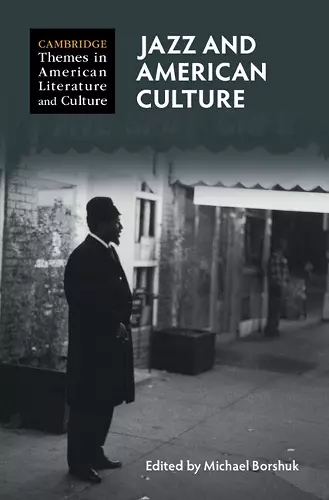Jazz and American Culture
Format:Hardback
Publisher:Cambridge University Press
Published:30th Nov '23
Currently unavailable, and unfortunately no date known when it will be back

This book explores jazz as a cultural lodestone and source of critical inquiry for over a century.
This book offers an entry point for understanding the comprehensive way this uniquely American artistic form has influenced literature, art, film, and other art forms, while also providing a cultural space for political commentary or social critique.Almost immediately after jazz became popular nationally in the United States in the early 20th century, American writers responded to what this exciting art form signified for listeners. This book takes an expansive view of the relationship between this uniquely American music and other aspects of American life, including books, films, language, and politics. Observing how jazz has become a cultural institution, widely celebrated as 'America's classical music,' the book also never loses sight of its beginnings in Black expressive culture and its enduring ability to critique problems of democracy or speak back to violence and inequality, from Jim Crow to George Floyd. Taking the reader through time and across expressive forms, this volume traces jazz as an aesthetic influence, a political force, and a representational focus in American literature and culture. It shows how Jazz has long been a rich source of aesthetic stimulation, influencing writers as stylistically wide-ranging as Langston Hughes, Eudora Welty, and James Baldwin, or artists as diverse as Aaron Douglas, Jackson Pollock, and Gordon Parks.
'In this elegant, bold, ambitious, and much-needed intervention in the standard histories of Jazz, Borshuk brings together an all-star cast of leading scholars on a comprehensive set of topics that together enable us all to make a great leap forward in understanding the music's essential relation to American culture. The book begins with several insightful discussions of the specific aesthetic features that define jazz in the context of improvisation, race, literature, and performance, then situates the music historically in terms of Harlem, Modernism, and the watershed upheaval that peaked in 1968; from there, it connects jazz to American vernacular, the personal style of “cool,” and the music's eventual and always fraught relations with institutions of various kinds, its representation in poetry, autobiography, liner notes, and in the visual realm from cinema to TV to photography. An invaluable resource, a stunning achievement.' T. R. Johnson, Tulane University, Author of New Orleans: A Writer's City
'Borshuk's collection of 22 uniformly excellent essays is evidence of how vibrant, multifaceted, and productive the field of 'new jazz studies' has been. Each chapter is concise and tightly argued; several exemplify the inspiration and creativity of the music itself. Impressively, the volume holds together thematically while addressing a wide variety of topics … Highly recommended.' E. T. Atkins, CHOICE
'… displays a liberal reading of the history and impact of jazz, further locating it as a cultural touchstone in the twenty-first century.' John Clark, Notes: the Quarterly Journal of the Music Library Association
ISBN: 9781009420198
Dimensions: 236mm x 158mm x 27mm
Weight: 730g
400 pages